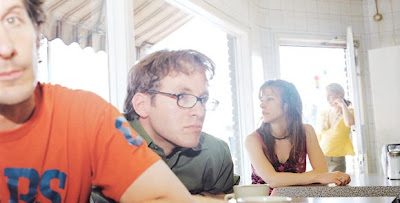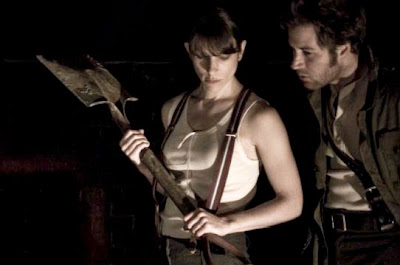1) What the fuck is going on?
It’s great to be back in Toronto. We are only here for three more days and then it’s back to the grind of the Big Apple – serving up steak and fries to a “bridge and tunnel” crowd in Manhattan’s Meatpacking District. What a glamourous life!
Just recently moved to the Fort Green section of Brooklyn to escape from the soaring rental costs of the East Village. Although I have to honestly say that I miss TO. Sometimes it feels like you spend so much time trying to make ends meet in New York that there never seems to be enough time to build community.
2) What’s the story behind the name of your company, Bluemouth Inc.?
Richard Windeyer and I joined the collective a year after they decided on the name. Bluemouth was originally comprised of four women who came together to create a performance for the Edgy Women Festival hosted by Studio 303 in Montreal. The name Bluemouth comes from Navajo mythology referring to the Bluemouth fringe god.
3) Do you have any unifying theories about the performer-spectator relationship?
Definitely nothing unifying. The performer-spectator relationship is an aspect of our work which is in constant flux. Part Boal, part Grotowski, part spectator sport. We like it up close and intimate. Each location suggests new opportunities for exploring the dynamics between the viewer and participant. I believe the idea is to eventually remove the fourth wall from the equation entirely. Down with the passive viewer!
4) Is avant-garde, boundary-pushing art somehow fundamentally more worthy than art that reinforces or sustains the status quo?
To quote Bjork, “we are theatrical scientists.” It’s really not an issue of more or less. We do what makes us happy – looking at unique ways of perceiving performance is what keeps bringing us back to the process.
It’s all so relative anyhow. Whatever we may think is boundary-pushing may be tame in comparison to most of the performance art I’ve seen. How about the French performance artist Orlan, who has undergone numerous plastic surgeries to transform her face and body to challenge traditional perceptions of beauty? Now that’s commitment.
5) Does How Soon Is Now arrive at any conclusions about German identity?
No. We inadvertently discovered the German links to the piece. One of the original inspirations for the piece was the film M by Fritz Lang. We played around with doing the entire piece in German, but laughed too much when ever we tried to rehearse in German. It stayed in the process because it had a particular resonance that seemed to fit the work. It is quite obviously a cinematic cliché of evil.
6) How has working as a interdisciplinary team influenced your individual approaches to making art?
It has definitely expanded our individual palette’s in numerously different directions. Whether one’s tendency is toward abstract movement and sound or another’s is toward emotional values, we are constantly challenging one another’s habitual tendencies.
 7) Do you have a working definition of what it means to be an artist?
7) Do you have a working definition of what it means to be an artist?
Artist, activist, social conscious being. Ionesco said it is the responsibility of the intelligent individual to make sure that they are not of the side of the executioner.
8) Do you believe conservative, right-wing politics are somehow fundamentally at odds with the arts community?
Politics, politics, politics. Here we go again looking down the barrel of a shotgun. Same old banjo playing, hog stomping, band wagon of bozos, looking for election, re-election, resurrection and insurrection. The same people shoving shit down your throats are the ones signing your checks at the end of the month. You want change? Change your lives.
9) Have you learned any tough lessons recently that have helped you take your work to the next level?
Being in New York has forced us to step up to the plate. Not that New York is this mythological place as portrayed by the art media. The thing that is inspiring is that you end up rubbing elbows with the elite on a regular basis (even if it means I am just serving up a burger to Sam Shepard or getting coffee for Elizabeth La Compte or watching television with Ellen Stewart). It seems that much easier or closer – when you’re constantly reminded that people are simply people and the only thing standing between yourself and success (of any form) is your desire and determinations. I know that sounds simplistic, but . . .
10) What kind of questions do you like to be asked about your work?
Probing questions that reveal artificiality. Controversial and awkward questions that create opportunities to have true and meaningful discussions about the human condition.


A fitting companion interview to all this talk about the New York City problem, me thinks.
these guys do awesome stuff. i went to one of their shows at summerworks that required being blindfolded on a school bus and taken to a secret location (Dufferin and Queen). i think they did a great job of destroying the passive viewer with that show….I did a have a strange experience there that i’ve always wanted to ask someone from the company about though:
i ended up being selected as an audience member who had to do this back balancing exercise with a stranger in front of the huge audience they had drawn, it was high pressure and the exercise never officially ended, the show went somewhere else and eventiually we scrambled after the action.
this was no big deal to me. i went to theatre school, i can stand in front of a gazillion people, be told i’m shit, and shrug it off before dinner. but i wondered how a non-performer would have responded to the experience. do you guys worry that this aesthetic alienates regular non theatre joes from your work?